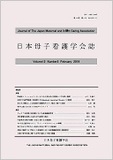Japanese
English
- 有料閲覧
- Abstract 文献概要
- 参考文献 Reference
- サイト内被引用 Cited by
要旨
目的
日本の10代女性が妊娠して出産に至る割合(出生数と人工妊娠中絶数と自然死産数を加算し、出生数で除す)を算出すると、2002年の32%から2016年は43%へ10%も増加し、少子化が加速する中で注目すべき状況である。本研究の目的は若年母への支援に向けて、助産師とソーシャルワーカーからみた若年母の特徴および支援と課題を面接調査から明らかにすることである。
対象と方法
研究デザインは質的記述的研究とした。研究協力者は、病院で若年母のケアや生活の支援に関わった経験のある助産師5名と、ソーシャルワーカー2名の計7名とした。研究者3名が研究協力者に1対1で1時間程の半構成的面接を行った。インタビューガイド項目は、「支援者からみた若年母の特徴」、「支援と課題」について聞き、面接内容は研究協力者の承諾を得て録音した。
逐語録から若年母の特徴と支援・課題に関する記述を抽出して質的な内容分析に準じてコード化し、さらに類似性等で抽象度を高めてカテゴリー化した。本研究は、東京女子医科大学倫理委員会の承認を得て行った(承認番号2914)。
結果
①若年母の特徴として、【知識不足や安易な決断がもたらす周産期リスク】、【妊娠の受容や支援の差による複雑な心理】、【自分本位の逸脱した日常生活】、【愛着の芽生えと親になりきれない現実】、【問題あるパートナーとの危うい関係】、【複雑な背景の親子関係】、【若年母を見受ける地域性】のカテゴリー7個を得た。②若年母の支援と課題は、【妊娠期からの生活に対する働きかけ】、【親役割の自覚を促す支援】、【妊娠期から育児期にかけて多職種と連携した支援】、【支援の理想と現実のジレンマ】、【地域連携の手応えと課題】、【若年母の支援者に必要な能力】、【医療スタッフ育成】のカテゴリー7個を得た。
考察
若年母は、自分本位に日常生活を過ごして周産期リスクを招きやすいことや予期せぬ妊娠から親になりきれないこと、実親やパートナーからのDVが疑われる場合もあることなどハイリスクな特徴が見出された。そのため、妊娠期から育児期にかけて助産師と虐待防止委員やソーシャルワーカーで連携して支援すること、若年母への育児指導と併行して実親にも祖父母役割を促す支援などが重要となった。
そして、退院後の地域連携者とのミーティング時に、その後の母児の様子などフィードバックを臨床助産師が得られるような仕組みづくりが助産師のジレンマ解消の一手段になると示唆された。今後、若年母に関わる支援者の養成講座が普及することを期待する。
結論
若年母には家族やパートナーとの脆弱な関係を有しながら、自分本位な考え方など青年期の課題に加えて母親役割獲得など成人期の発達課題も加味して危機的状態に陥りやすい特徴があることが見出された。
今後は、若年母の特徴に沿いながら妊娠経過を逸脱しないような身体作りや親役割の自覚への支援など多職種との連携強化が示唆された。
Purpose
The teenage pregnancy and birth rate in Japan has increased by 10%, from 32% in 2002 to 42% in 2015. These figures are remarkable considering the declining overall birth rate in the country. The purpose of this study was to clarify the characteristics of teen mothers as well as identify associated issues and need for support from the perspective of midwives and social workers. Findings are based on a face-to-face interview.
Subjects and Methods
This study was a qualitative descriptive design. The subjects included seven social workers and midwives, each with at least 3 years of clinical experience. They all participated in semi-structured interviews that lasted for approximately 1 hour. Characteristics of teen mothers and descriptions of support needs and other issues were extracted from interview transcripts and coded. The degree of abstraction was increased, and responses were categorized. This study was approved by the Ethics Committee of Tokyo Women's Medical University (approval no.: 2914).
Results
The following seven categories were extracted as characteristics of teen mothers: 1) perinatal risks resulting from lack of knowledge and hasty decision making, 2) complicated mentality due to differences in acceptance of pregnancy and support, 3) daily lifestyle, which is self-centered and deviates from a healthy manner, 4) budding affection and the reality of not being able to fully become a parent, 5) perilous relationships with problematic partners, 6) parent-child relationship with complicated background, and 7) region of the country with many teen mothers. Accordingly, the following seven categories were extracted in terms of support for teen mothers: 1) daily lifestyle encouragement during pregnancy, 2) support to encourage self-awareness in a parental role, 3) multidisciplinary support coordinated with other professional fields for pregnancy and parenting, 4) dilemma between ideal support and reality, 5) regional coordination response and issues, 6) abilities required for supporters of teen mothers, and 7) cultivating knowledge and skills of medical staff.
Discussion
High-risk characteristics found in teen mothers include the fact that their self-centered approach in their daily lives makes them more susceptible to perinatal risk and that they are often unable to fully embrace their role as parents because their pregnancies were unforeseen; moreover, domestic violence by parents or partners may be suspected. Accordingly, it is important to provide coordinated support from midwives, abuse prevention officers, and social workers from pregnancy through to the child-rearing stage and simultaneously encourage the mother's parents to take on a grandparenting role along with childcare guidance for teen mothers.
It was further suggested that creating a system that allows clinical midwives to obtain feedback on the subsequent condition of mothers and babies during consultation with healthcare partners in the community following discharge would constitute a means for eliminating the dilemmas faced by midwives. In future, we expect that training courses for those supporting teen mothers propagates further.
Conclusions
Teen mothers tend to easily fall into a critical state. Along with having fragile relationships with their family and partner, they face adolescent issues, such as a self-centered attitude, and adult developmental issues, such as acquiring the role of a mother. Results reveal the need for support and empathy for teen mothers to help them nourish their bodies during pregnancy and become aware of their parental role so that this life-changing experience progresses in a healthy manner. It is suggested that future issues for social workers and midwives include enhancing multidisciplinary coordination of in-hospital support and promoting increased implementation of training for caregivers and family to acquire an understanding of the characteristics of teen mothers.
Copyright © 2019, The Japan Maternal and Infant Caring Association All rights reserved.


